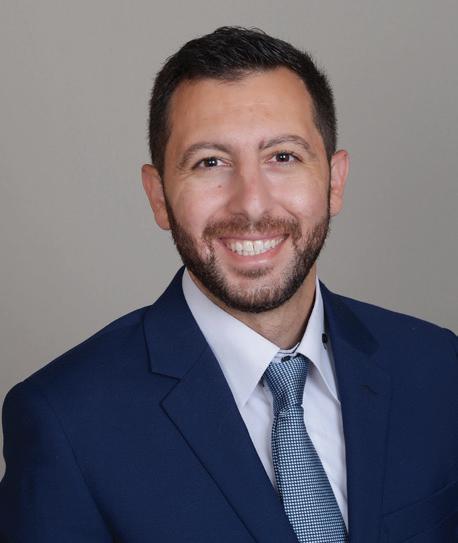
3 minute read
NOAH WEAVER
Noah Weaver was born in Palm Springs, California and grew up in Iowa City, Iowa before deciding to attend the University of Arizona in Fall 2020. Noah is a rising senior with a double major in Physiology and Medical Sciences and then Public Health with an emphasis in Health Promotion. Additionally, Noah is set to graduate with a double minor, in both Biochemistry and Spanish. After graduation, Noah plans to enter Medical School and specialize in Pediatrics. In addition to being a Pediatric physician, Noah has great goals to work with underserved communities throughout the world to bridge the many health disparities that currently exist. A major health disparity Noah is passionate about connects to how lack of access to healthy diets can increase rates of systemic diseases, such as diabetes and CVDs, in the Hispanic community. Noah works as a Medical Scribe at a Cardiology Clinic, a tutor at the UA SALT Center, and a research assistant at the UA Sleep and Memory Research Lab. In his free time, Noah loves to spend time outside with friends and family. One of his favorite activities is to go on hikes at beautiful places such as Mt. Lemmon and Sabino Cannon. Lastly, Noah is a huge UA Sports fan and can often be seen in the middle of the ZonaZoo cheering on our amazing sports teams here. He would like to thank the ODEI and all faculty for this amazing summer internship opportunity and recommends all students interested in the health field check it out!
⊲ PROJECT Differences in Cardiovascular Function in Children with Down Syndrome during Swim Exercise
Advertisement
As part of Dr. Jamie Edgin’s Research Lab, Noah’s research seeks to better understand the differences in cardiovascular function in children with Down Syndrome vs typically developing children, using swimming as he mechanism to increase the heart rate of participants. In the summer of 2022, we saw that swimming effectively increased the average HR for both groups. Data collection included DS (N = 12), ages 6-16 (mean = 10.97) and TD (N = 13) children ages 5-12 (mean = 8.08) years participated in the University of Arizona Campus Recreation Center’s two-week swim camp, for a total of eight, 30-minute evening swim sessions. Group differences were observed for average and maximum HR only while swimming, but not baseline, between children with and without Down syndrome. In other words, children with Down syndrome had statistically lower heart rates than typically developing children while exercising, but not when they are sedentary. When the children swam, we saw that heart rate range increased more for typically developing children than children with down syndrome. Throughout this 2023 summer, we have continued our work with an additional 25 children. Results thus far have shown consistency in the data concluded last summer, but future data collection will better confirm this idea. Noah looks forward to the presentation and poster session opportunity and would love to answer any questions that you may have. Thank you so much!
JAMIE EDGIN PhD Associate Professor, Psychology Jedgin@arizona.edu
Jamie Edgin is a Psychologist specializing in the area of Developmental Cognitive Neuroscience. Her area of expertise is memory development and sleep in typical and atypical development. Dr. Edgin is an Associate Professor in the Cognition and Neural Systems Program in the Department of Psychology, with departmental and GIDP affiliations in Family Studies and Human Development, the Frances McClelland Institute, the School of Education, the Sonoran University Center for Excellence in Developmental Disability, and the Cognitive Science Graduate and Interdisciplinary Program. Dr. Edgin is a first generation college student.
Dr. Edgin serves on a number of national, state and local community boards to support individuals with developmental disabilities (visit our community outreach link). For her work in the community she received the University of Arizona’s Koffler Prize for Outreach in 2018. She visits parent advocacy groups across the globe, delivering talks in Canada and Mexico.
Dr. Edgin’s work in the early 2000s was instrumental in characterizing the specific learning/memory profiles (i.e., the individual strengths and weaknesses) of individuals with Down syndrome and autism. For these efforts, she received the 2015 David Cox “Rising Star” Award from the LuMind Foundation and the 2020 Distinguished Contribution to Science Award from the Arizona Psychological Association. Dr. Edgin’s most recent work has shown links between sleep problems and cognition in Down syndrome and is the first empirical evidence to suggest that poor sleep may limit how well these individuals can learn to communicate. Dr. Edgin has numerous national and international collaborations, including collaborations with UNAM/Mexico City. In 2014 she was awarded a Bill and Melinda Gates Foundation Grand Challenges Explorations Grant to study sleep disturbance in at-risk infants. She has been continuously funded by the NIH/ NICHD since 2010. Finally, she is the Director of the Sonoran UCEDD pollicy fellowship in developmental disabilities, and is engaged in efforts to support advocacy and policy change for individuals with disability in the state of Arizona.






